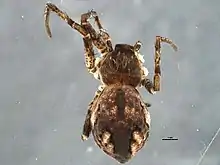| Apollophanes | |
|---|---|
 | |
| A. margareta | |
| Scientific classification | |
| Domain: | Eukaryota |
| Kingdom: | Animalia |
| Phylum: | Arthropoda |
| Subphylum: | Chelicerata |
| Class: | Arachnida |
| Order: | Araneae |
| Infraorder: | Araneomorphae |
| Family: | Philodromidae |
| Genus: | Apollophanes O. Pickard-Cambridge, 1898[1] |
| Type species | |
| A. punctipes (O. Pickard-Cambridge, 1891) | |
| Species | |
|
14, see text | |
| Synonyms[1] | |
| |
Apollophanes is a genus of running crab spiders that was first described by Octavius Pickard-Cambridge in 1898.[4]
Species
As of September 2022 it contains fourteen species, found in the Caribbean, South America, Asia, Canada, Mexico, the United States, and Panama:[1]
- Apollophanes aztecanus Dondale & Redner, 1975 – Mexico
- Apollophanes caribaeus Dondale & Redner, 1975 – Trinidad
- Apollophanes crispus Dondale & Redner, 1975 – Panama
- Apollophanes erectus Dondale & Redner, 1975 – Mexico
- Apollophanes fitzroyi Baert, 2013 – Ecuador (Galapagos Is.)
- Apollophanes gaucho Francisco, Ott & Teixeira, 2016 – Brazil
- Apollophanes indistinctus Gertsch, 1933 – Mexico
- Apollophanes lonesomegeorgei Baert, 2013 – Ecuador (Galapagos Is.)
- Apollophanes longipes (O. Pickard-Cambridge, 1896) – Mexico
- Apollophanes macropalpus (Paik, 1979) – Russia (West Siberia to Far East), Korea
- Apollophanes margareta Lowrie & Gertsch, 1955 – USA, Canada
- Apollophanes punctatus (Bryant, 1948) – Hispaniola
- Apollophanes punctipes (O. Pickard-Cambridge, 1891) (type) – USA to Panama
- Apollophanes texanus Banks, 1904 – USA, Mexico
See also
References
- 1 2 3 Gloor, Daniel; Nentwig, Wolfgang; Blick, Theo; Kropf, Christian (2019). "Gen. Apollophanes O. Pickard-Cambridge, 1898". World Spider Catalog Version 20.0. Natural History Museum Bern. doi:10.24436/2. Retrieved 2019-07-04.
- ↑ Schick, R. X. (1965). "The crab spiders of California (Araneae, Thomisidae)". Bulletin of the American Museum of Natural History. 129: 86.
- ↑ Dondale, C. D.; Redner, J. H. (1975). "Revision of the spider genus Apollophanes (Araneida: Thomisidae)". The Canadian Entomologist. 107 (11): 1176. doi:10.4039/Ent1071175-11. S2CID 86155160.
- ↑ Pickard-Cambridge, O. (1898), "Arachnida. Araneida", Biologia Centrali-Americana, Zoology
Further reading
- Adams, Richard J.; Manolis, Timothy D. (2014). Field Guide to the Spiders of California and the Pacific Coast States (California Natural History Guides). University of California Press. ISBN 978-0520276611.
- Bradley, Richard A. (2012). Common Spiders of North America. University of California Press. ISBN 978-0520274884.
- Dean, D.A. (2016). "Catalogue of Texas spiders". ZooKeys (570): 1–703. Bibcode:2016ZooK..570....1D. doi:10.3897/zookeys.570.6095. PMC 4829797. PMID 27103878.
- Foelix, Rainer F. (2010). Biology of Spiders (3rd ed.). Oxford University Press. ISBN 978-0199734825.
- Griswold, Charles E.; Audisio, Tracy; Ledford, Joel M. (2012). "An extraordinary new family of spiders from caves in the Pacific Northwest (Araneae, Trogloraptoridae, new family)". ZooKeys (215): 77–102. Bibcode:2012ZooK..215...77G. doi:10.3897/zookeys.215.3547. ISSN 1313-2989. PMC 3428790. PMID 22936872.
- Jackman, John A. (2002). A Field Guide to Spiders and Scorpions of Texas. Gulf Publishing. ISBN 978-0877192640.
- Muster, C. (2009). "The Ebo-like running crab spiders in the Old World (Araneae, Philodromidae)". ZooKeys (16): 47–73. Bibcode:2009ZooK...16...47M. doi:10.3897/zookeys.16.230.
- Ubick, D.; Paquin, P.; Cushing, P.E.; Roth, V., eds. (2005). Spiders of North America: An Identification Manual. American Arachnological Society. ISBN 978-0977143900.
- Wheeler, W.C.; Coddington, J.A.; Crowley, L.M.; Dimitrov, D.; et al. (2016). "The spider tree of life: phylogeny of Araneae based on target-gene analyses from an extensive taxon sampling". Cladistics. 33 (6): 576–616. doi:10.1111/cla.12182. PMID 34724759. S2CID 35535038.
This article is issued from Wikipedia. The text is licensed under Creative Commons - Attribution - Sharealike. Additional terms may apply for the media files.